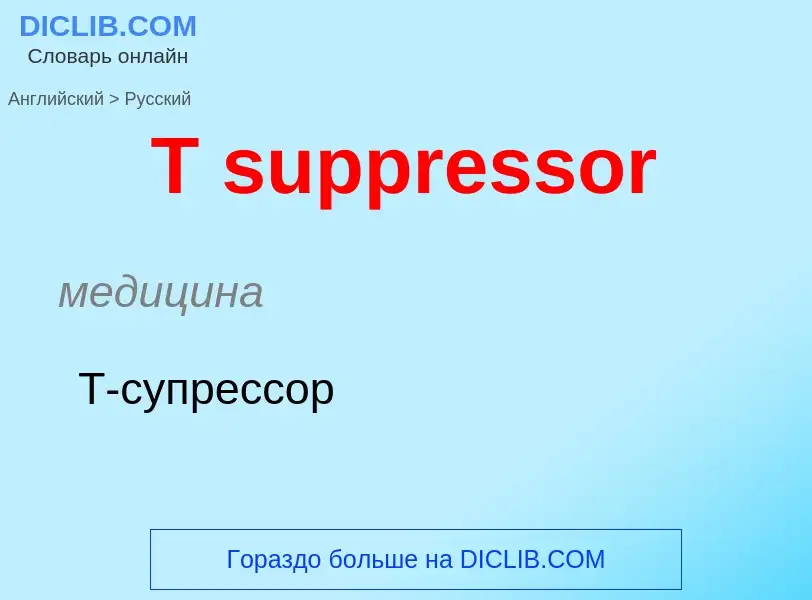Übersetzung und Analyse von Wörtern durch künstliche Intelligenz ChatGPT
Auf dieser Seite erhalten Sie eine detaillierte Analyse eines Wortes oder einer Phrase mithilfe der besten heute verfügbaren Technologie der künstlichen Intelligenz:
- wie das Wort verwendet wird
- Häufigkeit der Nutzung
- es wird häufiger in mündlicher oder schriftlicher Rede verwendet
- Wortübersetzungsoptionen
- Anwendungsbeispiele (mehrere Phrasen mit Übersetzung)
- Etymologie
T suppressor - Übersetzung nach russisch
медицина
Т-супрессор
медицина
антионкоген
Definition
. ·сокр. т. е., то есть; т. к., так как; и т. д. и так далее; и т. п., и тому подобное; т., том; тысяч.
Wikipedia
The regulatory T cells (Tregs or Treg cells), formerly known as suppressor T cells, are a subpopulation of T cells that modulate the immune system, maintain tolerance to self-antigens, and prevent autoimmune disease. Treg cells are immunosuppressive and generally suppress or downregulate induction and proliferation of effector T cells. Treg cells express the biomarkers CD4, FOXP3, and CD25 and are thought to be derived from the same lineage as naïve CD4+ cells. Because effector T cells also express CD4 and CD25, Treg cells are very difficult to effectively discern from effector CD4+, making them difficult to study. Research has found that the cytokine transforming growth factor beta (TGF-β) is essential for Treg cells to differentiate from naïve CD4+ cells and is important in maintaining Treg cell homeostasis.
Mouse models have suggested that modulation of Treg cells can treat autoimmune disease and cancer and can facilitate organ transplantation and wound healing. Their implications for cancer are complicated. Treg cells tend to be upregulated in individuals with cancer, and they seem to be recruited to the site of many tumors. Studies in both humans and animal models have implicated that high numbers of Treg cells in the tumor microenvironment is indicative of a poor prognosis, and Treg cells are thought to suppress tumor immunity, thus hindering the body's innate ability to control the growth of cancerous cells. Immunotherapy research is studying how regulation of T cells could possibly be utilized in the treatment of cancer.


![The recruitment and maintenance of T<sub>reg</sub> cells in the [[tumor microenvironment]] The recruitment and maintenance of T<sub>reg</sub> cells in the [[tumor microenvironment]]](https://commons.wikimedia.org/wiki/Special:FilePath/Regulatory T cell recruitment in tumors.jpg?width=200)



![Integral suppressor on [[VSS Vintorez]] sniper rifle and [[AS Val]] assault rifle Integral suppressor on [[VSS Vintorez]] sniper rifle and [[AS Val]] assault rifle](https://commons.wikimedia.org/wiki/Special:FilePath/AS Val & VSS Vintorez - RaceofHeroes-part2-34 (cropped).jpg?width=200)


![Nielsen device]] protruding (completely assembled) Nielsen device]] protruding (completely assembled)](https://commons.wikimedia.org/wiki/Special:FilePath/Nielsen device area of YHM Cobra .45 suppressor.jpg?width=200)






